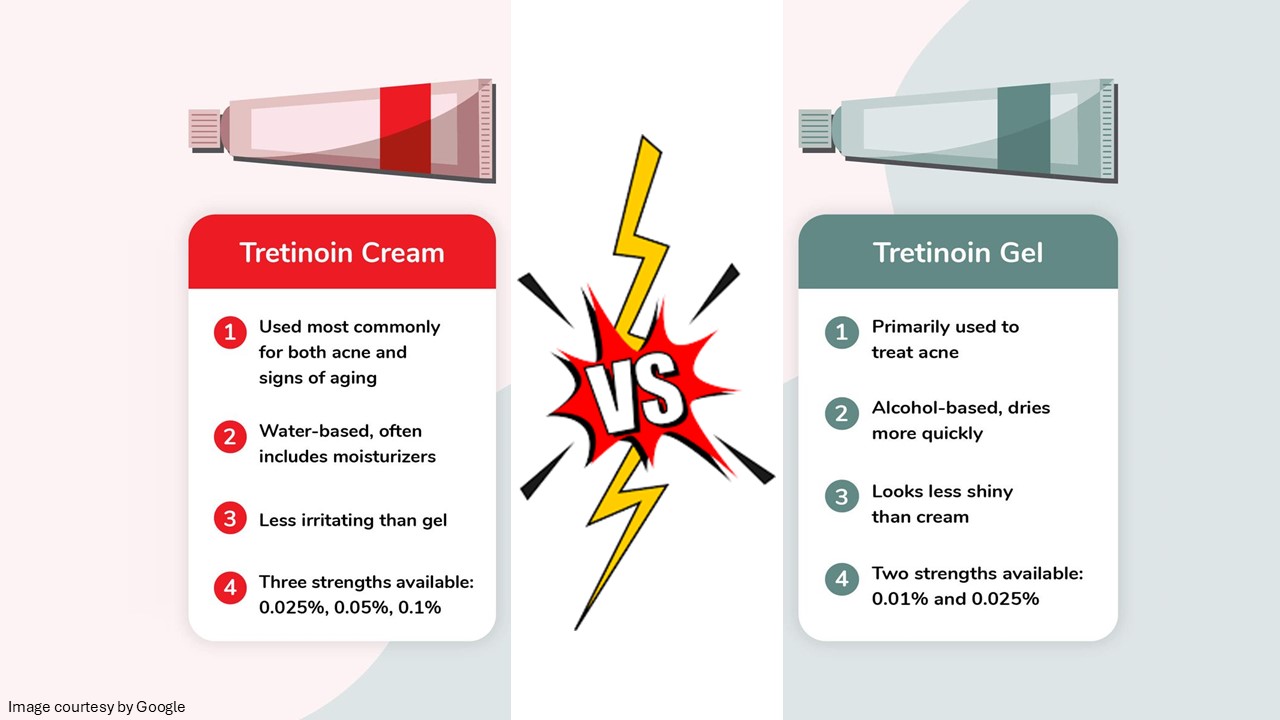Are you struggling to find the best way to clear your acne? You might be wondering if creams or gels work better for your skin.
Choosing the right treatment can feel confusing, especially when both promise great results. But what if the answer depends on your unique skin type and the kind of acne you have? Keep reading to discover which option could be the game-changer for your skincare routine—and finally help you get the clear, healthy skin you deserve.
:max_bytes(150000):strip_icc()/VWH-Nutrition-Retinol-vs-Retin-A-63a1173024a5457b8a523b1a9f1ebe1d.jpg)
Credit: www.verywellhealth.com
Types Of Acne Treatments
Acne treatments come in various forms. Each type works differently on the skin. Choosing the right one depends on skin type and acne severity. Creams and gels are two common options. Both have unique ingredients and effects.
Understanding their composition helps decide which suits your skin better. Let’s explore creams and gels in detail.
Creams: Composition And Benefits
Creams usually contain moisturizing ingredients. They have a thicker texture than gels. Creams are oil-based or water-based. They help hydrate dry or sensitive skin. Creams create a protective layer on the skin.
This layer locks in moisture. Creams can soothe irritation and redness. They often include ingredients like benzoyl peroxide or salicylic acid. These fight acne-causing bacteria and reduce inflammation. Creams absorb slowly, giving long-lasting effects.
Gels: Composition And Benefits
Gels have a lighter, water-based texture. They dry quickly after application. Gels often contain alcohol or other drying agents. These help reduce oily skin and shine. Gels are ideal for oily or combination skin types.
They penetrate pores deeply to clear blockages. Gels include active ingredients such as adapalene or salicylic acid. These unclog pores and reduce acne formation. Gels leave a matte finish and do not feel heavy.

Credit: miiskin.com
Skin Types And Treatment Suitability
Choosing the right acne treatment depends on your skin type. Different skin types react differently to creams and gels. Understanding your skin helps pick the best product. This ensures better results and less irritation.
Oily Skin And Gel Effectiveness
Oily skin produces extra sebum, causing shine and clogged pores. Gels work well for oily skin. They are lightweight and absorb quickly. Gels help reduce excess oil without blocking pores. Many gels contain ingredients that dry out pimples and clear bacteria. Using gels can prevent new breakouts on oily skin.
Dry Skin And Cream Preferences
Dry skin lacks moisture and feels tight or flaky. Creams provide more hydration and softness. They create a barrier that locks in moisture. Creams soothe dry, irritated skin caused by acne treatments. Using creams helps avoid over-drying and peeling. Creams with acne-fighting ingredients treat pimples gently on dry skin.
Effectiveness Against Acne
Choosing the right product for acne treatment is important. Both creams and gels can reduce acne but work in different ways. Understanding how each type fights acne helps pick the best option.
How Creams Target Acne
Creams are thick and moisturizing. They often contain ingredients like benzoyl peroxide or antibiotics. These help reduce bacteria and calm inflammation. Creams can soothe dry or sensitive skin. They form a barrier that protects skin while healing acne.
Creams work well for people with dry or normal skin. They deliver active ingredients slowly. This reduces irritation. Creams also help keep skin hydrated, which may improve healing.
How Gels Target Acne
Gels are lightweight and absorb quickly. They usually contain stronger doses of acne-fighting ingredients. Gels dry out oil and unclog pores fast. This helps stop acne from forming.
Gels suit oily or combination skin types best. They leave a matte finish and do not feel heavy. Gels can cause dryness or stinging if skin is sensitive. Their fast action can clear acne quicker.
Side Effects And Skin Reactions
Choosing the right acne treatment means thinking about side effects and skin reactions. Both creams and gels can cause some issues. Knowing what to expect helps in making a better choice for your skin type.
Common Side Effects Of Creams
Creams often cause dryness and redness. Your skin may feel tight or itchy. Some people notice peeling or flaking. Creams can sometimes make skin oily too. These effects usually appear in the first days of use. They often lessen as your skin gets used to the cream.
Common Side Effects Of Gels
Gels may cause stinging or burning sensations. They can dry out the skin more than creams. Some users report irritation or swelling. Gels might make sensitive skin feel uncomfortable. These reactions tend to happen soon after applying the gel. Skin often adapts over time, reducing side effects.
Application Tips For Best Results
Applying acne treatments properly improves their effectiveness. Using creams or gels the right way helps clear skin faster. Follow simple steps to get the best results from these products.
When To Use Creams
Creams work well on dry or sensitive skin. They add moisture while treating acne. Use creams at night to avoid shine during the day. Apply a thin layer on clean, dry skin. Avoid heavy use to prevent clogged pores.
When To Use Gels
Gels suit oily or acne-prone skin. They dry quickly and reduce excess oil. Use gels in the morning for a fresh feel. Apply a small amount on affected areas only. Let the gel absorb fully before adding other products.

Credit: www.alldaychemist.com
Expert Recommendations
Experts provide clear advice on using creams or gels for acne. They focus on the skin type and acne condition. Their tips help find the best fit for each person.
Choosing Based On Acne Severity
For mild acne, creams often work well. They soothe the skin and reduce redness. Gels suit more severe acne because they dry out pimples fast. Experts suggest starting with creams for gentle care. Then, move to gels if acne worsens.
Personalizing Treatment Plans
Every skin reacts differently to treatments. Experts recommend testing products on a small skin area first. They stress the importance of combining creams or gels with good skin routines. Personalized plans boost healing and reduce side effects. Regular check-ins with a dermatologist help adjust the treatment.
Frequently Asked Questions
Are Creams More Moisturizing Than Gels For Acne?
Creams generally provide more hydration than gels, making them suitable for dry or sensitive skin. Gels are lighter and better for oily skin, as they absorb quickly without clogging pores.
Which Is Better For Oily Skin: Cream Or Gel?
Gels are often better for oily skin because they are lightweight and non-greasy. Creams can sometimes feel heavy and may increase oiliness or cause breakouts.
Do Creams Or Gels Cause Fewer Acne Breakouts?
Gels typically cause fewer breakouts since they are less likely to clog pores. Creams may increase breakouts if they are too rich or not non-comedogenic.
Can Creams And Gels Be Used Together For Acne?
Yes, creams and gels can be combined for acne treatment. Using a gel for oil control and a cream for hydration balances skin needs effectively.
Conclusion
Choosing between creams and gels depends on your skin type and acne severity. Creams suit dry or sensitive skin by adding moisture. Gels work best for oily skin, drying out pimples quickly. Both can help clear acne if used correctly.
Pay attention to how your skin reacts. Consult a doctor if unsure about which product fits you. Consistency and patience bring the best results over time. Remember, no single product works for everyone. Find what suits your skin and stick with it.


Leave a Reply